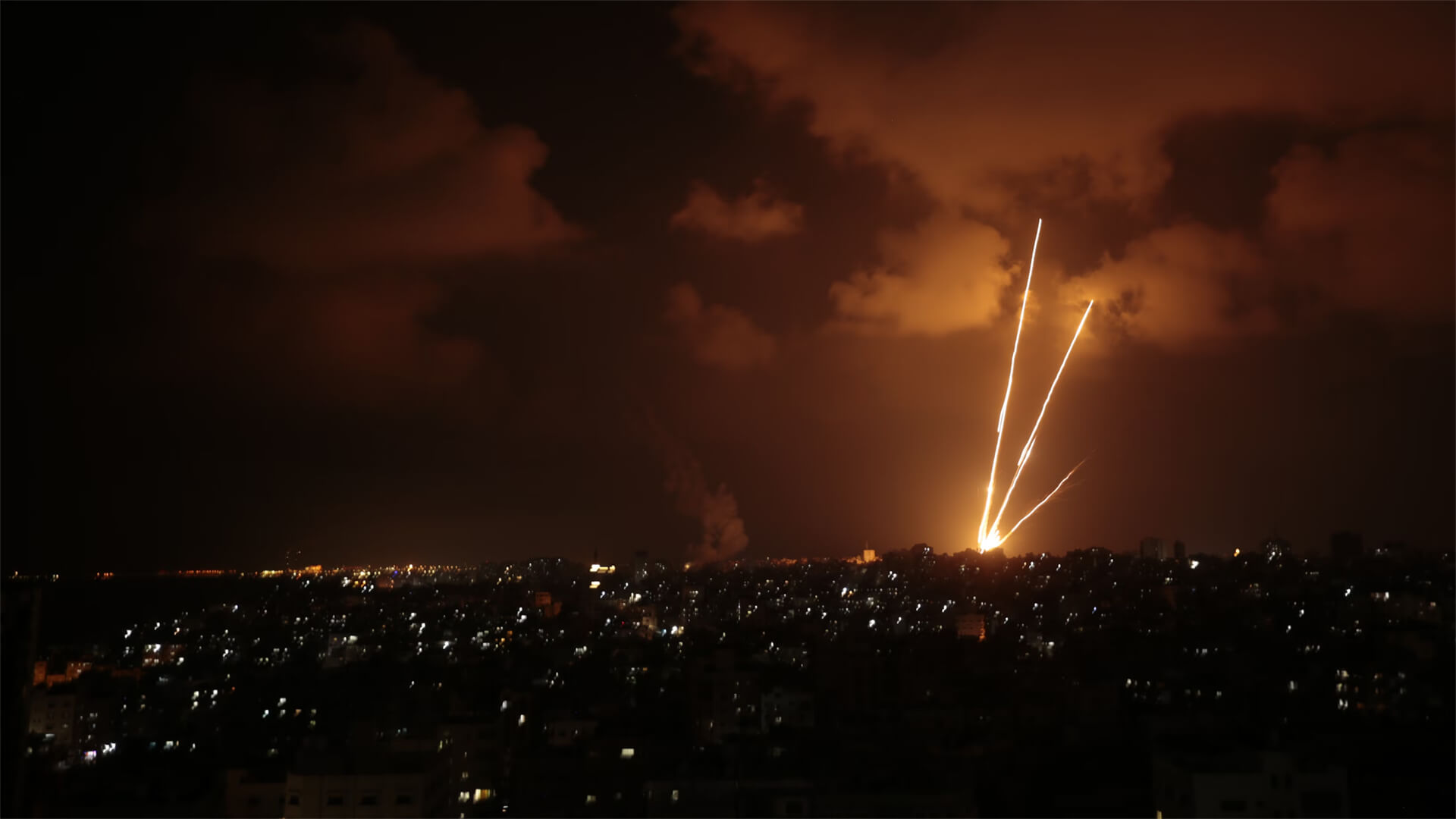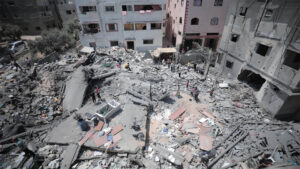WEBINAR – Peter Zeihan’s Risk List: What Keeps a Geopolitical Strategist Up at Night
Please join Peter Zeihan for a webinar on June 5th at 12:00 PM EST on a topic that is near and dear to the hearts of the Zeihan on Geopolitics team: geopolitical risk. This webinar will feature Peter’s reasonable-fear list, focused on issues that in his opinion have the most potential to impact market outcomes.
I’ve avoided talking about the Israel and Gaza conflict as much a possible (given that there’s no favorable outcomes for anyone involved), but some recent changes have forced my hand.
The humanitarian crisis in Gaza is reaching critical levels due to massive destruction and severe shortages of resources. The real kicker is Israel’s renewed offensive in northern Gaza; the presence of Hamas fighters and bodies of hostages in previously “cleared” areas has revealed some MASSIVE shortcomings in Israeli intelligence.
Hamas will continue to recruit new fighters, and do so rather effectively given the harsh conditions in Gaza. Israel will attempt to sort out its intelligence issues and military struggles. And all of this is an unfortunate indication that this conflict has no resolution in sight.
Here at Zeihan On Geopolitics we select a single charity to sponsor. We have two criteria:
First, we look across the world and use our skill sets to identify where the needs are most acute. Second, we look for an institution with preexisting networks for both materials gathering and aid distribution. That way we know every cent of our donation is not simply going directly to where help is needed most, but our donations serve as a force multiplier for a system already in existence. Then we give what we can.
Today, our chosen charity is a group called Medshare, which provides emergency medical services to communities in need, with a very heavy emphasis on locations facing acute crises. Medshare operates right in the thick of it. Until future notice, every cent we earn from every book we sell in every format through every retailer is going to Medshare’s Ukraine fund.
And then there’s you.
Our newsletters and videologues are not only free, they will always be free. We also will never share your contact information with anyone. All we ask is that if you find one of our releases in any way useful, that you make a donation to Medshare. Over one third of Ukraine’s pre-war population has either been forced from their homes, kidnapped and shipped to Russia, or is trying to survive in occupied lands. This is our way to help who we can. Please, join us.
Transcript
Hey, everybody. Peter Zeihan here. Coming to you from the via della Costa, which is the old Roman road that was used to transport everything, through the Ligurian coast of Italy back in the day. today is the 27th of May. You’ll clearly get this tomorrow. Anyway, today we’re going to talk about something that I, as a rule, have been avoiding.
And that’s the Gaza conflict. this is one of those intractable conflicts where there’s really no version of it that goes well for anyone. And when I first addressed this issue back in November, shortly after the October attacks by Hamas into Israel, if for those of you don’t remember the specifics, basically we had several hundred to a few thousand, two low hanging, Hamas fighters cross into Israel, kill over a thousand people, engage in a pillage of raping and destruction, and ultimately kidnaped, a fair number of hostages and then back to Gaza.
Israel shortly thereafter launched an invasion of the Gaza Strip, where Hamas is based, launching what has now been a six month conflict that has generated no end of bad press and horrors for everyone involved. there’s no version of this that ends with a settlement. Israel has been deeply wounded and isn’t going to stop. And Hamas has absolutely no problem sheltering behind the civilian population in Gaza.
And Israel has no problem targeting the civilian populations as part of an effort to get to Hamas. So there’s no there’s no friendly outcome here. and so I’ve been avoiding talking about it because when you have an intractable conflict like this, all you have is the horror. And both sides, based on your point of view, are doing horrible things.
So, I’ve been avoiding any work because we’ve had a an unfortunate development that makes this situation worse. over the last 2 to 3 months, Israel has been pushing steadily south, basically purging the territories of Hamas fighters as they go. And, the last reasonable estimate that I have seen suggests that somewhere upwards of two thirds of Hamas fighters have been killed.
So from a certain point of view, you know, if you get that number up to 100%, then the war’s over. Then we can get on to the next stage of reconstruction and figuring out what a post Hamas Gaza looks like. And that is absolutely the Israeli goal. what has most people occupied at the moment is that, the people in Gaza, the civilians who have has little to do with Hamas as they can pull off, have been compressed into an ever smaller territory as the Israelis have gone section by section through the Gaza Strip to cleanse it of the fighters.
as of about two weeks ago, we were anticipating something called the Rafah offensive. Rafah is the southernmost major city in, the Gaza Strip. And the hope, hope, hope was that we would be approaching the end game of this conflict. The idea is that all of Hamas has now been boxed into that section, and all Israel has to do is go in there and shoot them out.
Now, the humanitarian side of this, of course, is atrocious because as you’re basically taking the most densely populated chunk of territory in the world and bit by bit, removing the areas that civilians can go to. a humanitarian, crisis has erupted. about 60, 65% of the housing stock in Gaza has been destroyed already. So what’s left of people who were already living in what was basically a prison camp are now living in a compressed zone, raising less than a quarter of the land area.
So just, you know, a humanitarian tragedy. We are already seeing famine, at least on the scale of what went down in Venezuela two years ago and probably approaching what happened in Ethiopia in the 1980s. keep in mind that Gaza has nothing. they don’t generate their own power. They can’t grow their own food. there’s no value added manufacturing whatsoever.
They basically subsist on aid. So that’s where we were. And then about ten days ago, Israel announced that they were renewing an eye offensive in the northern part of Gaza, an area that supposedly they cleared months ago. Kabbalah, the refugee camp. I don’t know why they call it a refugee camp. The whole place is a refugee camp.
was the specific spot. It’s a place that used to be a Hamas stronghold, before the war began. And they have the Israelis have since completed that assault. And so here’s the problem. If this is an area that has already been cleansed, there shouldn’t be any Hamas fighters there at all. But what we’re learning is that Israeli intelligence is not nearly as good under the current government as it should be.
I mean, if there is any issue that Israel should be obsessed with, it’s what’s going on in the Palestinian territories because they’re hard up against them. And it was a failure of intelligence of the current government, that allowed the attacks of last October to occur. And now there’s been a follow up failure. And that even in areas that have been cleansed, Hamas is operating, suggesting that for the last six months of routine, what was the Israeli effort hasn’t been nearly as effective as they thought.
And in the last couple of days, we’ve gotten the results of this new Kabbalah offensive, and they found the bodies of some of the hostages. So it’s not just that the Israelis missed these people as they were going through the first time. They missed what was one of the primary worrying was just getting their people back, which means we’re entering into a new phase of the conflict where there is no end game.
Israel under the current government seems to be incapable of fighting this war to what the Israelis would consider a reasonable conclusion, and instead they’re getting dragged into a Afghan style semi urban campaign of just guerrilla suppression in an area that’s roughly one eighth, one ninth the size of Rhode Island and has a population of about 3 million.
This doesn’t end without something very seriously cracking and breaking, and it is not clear to me at the moment what that might be. on the Palestinian side, Hamas has now the perfect recruitment system. They are in a land war of occupation on their home turf. There are 3 million people living in poverty and starvation. That is the perfect recruiting tool.
And Hamas has been using it very aggressively and very successfully, would take a degree of PR incompetence to not be able to recruit in that environment. And on the Israeli side, the only way that this goes well for them is if they can break through this intelligence logjam and actually destroy Hamas faster than I can recruit. I don’t think that’s possible anymore unless you just kill everyone.
and so that’s very unfortunately the situation at the moment. And I don’t see it improving any time soon. I would love, love to end this one on a little bit of a positive note, but what little hope that I had that this conflict was about to wrap up is now gone, and we’re looking at something far more intractable.
Sorry.








